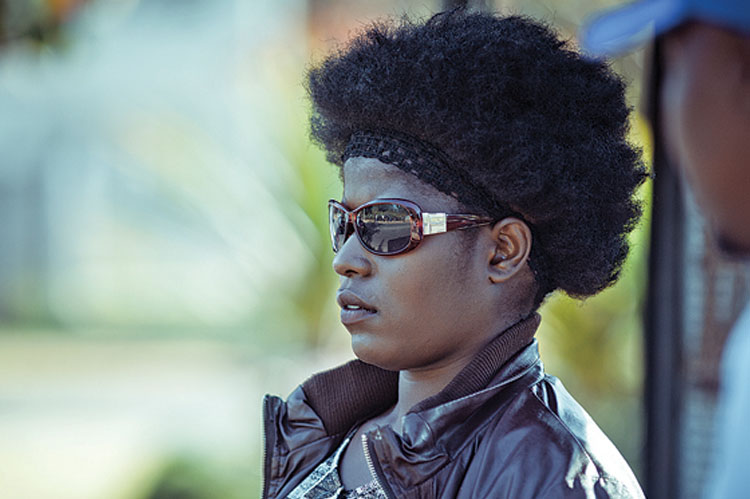Unseen belief: Tale of a blind dreamer

Leroy Dzenga Features Writer —
With the odds stacked against her, Edith Masango showed that impossible is a state of mind Her resilience coupled with faith, saw her rise from a midlife setback which gave her suicidal thoughts to being the lead actor in a local film.
Despite losing her sight during birth to a rare condition called Retinis Pigmentoza, Masango did not allow her vision in life to be blurred out. The confident actress relooked into her life journey pointing out how her poor eyesight stood in the way of her academics. Her eyesight had always been problematic from a tender age.
“I did my primary school at Glenview 3 Primary school and my high shool at Glenview High one. My whole life in school was difficult because I had poor eyesight and night blindness,” Masango said.
Her visual condition made it difficult for her to participate in all academic activities and she had to scrap to attain the four subjects she got when she sat her ordinary level examinations. She says her eyes were already failing her.
“I still remember after sitting for my ordinary level examinations, my eyesight continued to get poor. I paid a visit to the optician hoping he would prescribe a new set of lenses, instead, he told me that the glasses I had were the last ones I could get, losing my eyesight was inevitable,” she said.
This news against a deteriorating eyesight forced her to sit at home doing nothing for four years, from 16 to the time she was 20 years old. At 19, Edith thought she had found love in a man who had promised to be with her despite her weak eyesight.
“When I met my ex-husband, he did not have any problems with my eye condition, everything was moving very well,” she said.
Their decision to take their relationship to the next level revealed a different man from the one she had grown fond of.
“At 20, I decided to move in with my then boyfriend. Everything was going on well until I got pregnant that is when he started turning from the man I had gave my heart to someone I could not recognize,” Masango said of her ex-husband.
Unnerving questions of an insensitive tone followed as he started displaying a worrying attitude towards her.
“When I was about three months pregnant, he started abusing me verbally, asking me how I was going to take care of the baby and family with my poor eyesight,” she said.
When the abuse turned physical, Edith decided to return to her family spending the remaining six months of her pregnancy at her parents` house. She says she lost her sight a few days after she gave birth to her son Simbarashe in 2012, an occurrence which plunged her into two years of isolation.
“When I lost my sight, I slid into a bad space. I was suicidal and did not want to talk to anyone about my situation,” she said.
She felt as if all these people trying to sympathize with her did not understand what she was going through in her life.
“A number of therapists and family made attempts to talk to me and I simply shut them out, I preferred sitting in solitude without any outside interactions,” she said.
The self-imposed isolation went on for about two years until a conversation with her grandmother changed her perspective. Retinis Sigmentoza is a hereditary eye condition associated with retinal degeneration and Masango`s grandmother suffered the same fate as her. This made her feel that her grandmother understood things from her perspective and agreed to stay with her for six months, while recollecting her energy.
“The turning point was when I went to the rural areas to receive counseling from my grandmother who also got blind under the same conditions,” she said.
Her stay made her realize that even without physical sight, one must not lose their vision.
“My grandmother told me that being blind is not the end of the world, there is always a way out.
She told me that the first step towards healing is acceptance,” said Masango.
With a clean mind fresh off rehabilitation at her rural areas, Edith enrolled at the Dorothy Duncan Braille Library in January 2015 with an aim to gain life skills. She learnt switchboard operations, daily living skills, mobility, computers and agriculture. Edith said her stint at the Dorothy Dorcas Braille Library gave her hope through meeting people living with the same condition.
“At the Braille Library I met inspirational people like Liberty Mkhululi Lupahla, Masimba Kuchera and Shelter who is a receptionist at the centre. Seeing these people achieiving things in their lives pushed me,” she said.
Her entrance into film, though coincidental opened up opportunities for her.
“I was invited by a friend of mine to come assist an actress who wanted to execute a blind artist role. When I met with the director Justice Chipwanya he then offered me the role to play Jane in the movie, The Collector ,” she said.
Despite her lack of any professional film training, she said her two brothers helped her remember the line by reading them out loudly. The film became a favorite among attendees at last year`s Zimbabwe Film Festival and As said, art imitates life, her portrayal of Jane the poor blind artist who managed to turn around her fortunes, opened up an opportunity for her.
“My acting role got me invited for a job at the Zimbabwe International Film Festival as a receptionist and I have grown to love my job.
I am surrounded by people who treat me like a normal human being, not a person living with a disability,” she said of her fellow staffers at ZIFF.
The job brought to her reprieve as she is now able to assist her family financially as well as take care of her ,Edith finds her own way to work on a daily basis, a routine which has earned her friends with curious characters.
“From our home in Southlea Park, my younger brothers Takudzwa and Blessed walk me to the bus stop where I get transport to town,” she said.
After she drops off at Rezende street in the downtown area in the CBD, Street touts from the area with whom she has etched a friendship helps her cross Charter Street into Leopold Takawira.
“As soon as I get into Leopold Takawira, I use my can stick to walk until I get close to Copa Cabana, my tout friends there also assist me to get into Kensington kombis,” she said.
In Kensington she is dropped about 50 metres from her workplace, onto a path she has expertly mastered. As it is to any person, navigating in the Harare CBD can be a tall order and the challenges have not spared Edith.
“Some have tried to take advantage with me, at instances I have had men make odd comments to me as I walk around with my can stick,” said Masango.
She recalls one encounter which left her scarred up to date.
“I remember at this one point, a certain woman offered to help me cross the road but as she assisted me she kept asking me questions like, where is your family? Why do they let you walk alone? Do you know you can kidnapped in Harare and used for ritual purposes?,” she said.
Negative remarks of that nature have made her skeptical about seeking help from people as most fail to strike a between being too nice and being insensitive. She uses a computer aided with a software which makes the prompt and control process easy for her.
“I use my computer to do most things that visually capable people use, I read my emails, read articles online using a software called JAWS,” Masango said.
JAWS is an acronym for Job Access With Speech, a special voice software which allows visually impaired users to access the computer through voice instruction. Masango credits her child Simbarashe as her pillar of strength and says she still envisions a bright future for herself despite her condition. Simbarashe is also her personal guide when she want to take a refreshing walk.
“I have a longstanding love with music and if I get the opportunity, I intend to venture into radio presenting,” Masango said.
Masango says despite not being able to see how she did in the film she starred in,she hopes to get more acting roles in the future. She feels she can use her experience to reach out to people who may be depressed by a sudden twist of fate and offer words of hope to those who feel the world has nothing more to offer. Despite being content with the situation she finds herself, she misses a few activities which are now impossible to partake in because of her condition.
“I miss going out for game drives with my family and sight seeing. I have always been a nature enthusiast although all that is left is to try and remember what I saw growing up,” she said with a smile.
Despite her lack of sight in the physical space, Masango has refused to let her vision die, for it is the conviction that matter.
Feedback : [email protected]








Comments